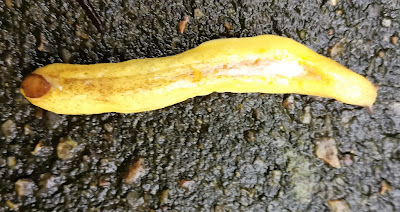This blog may help people explore some of the 'hidden' issues involved in certain media treatments of environmental and scientific issues. Using personal digital images, it's also intended to emphasise seasonal (and other) changes in natural history of the Swansea (South Wales) area. The material should help participants in field-based modules and people generally interested in the natural world. The views are wholly those of the author.
Sunday, 13 March 2022
Shelling Out?
To increase the awareness of the Phylum's importance, a German museum is urging people to vote for their 'Mollusc of the Year' (https://www.theguardian.com/environment/2022/mar/13/vote-now-painted-snail-and-shipworm-vie-for-mollusc-of-the-year-title-aoe). The competition has 5 nominations for title of 'Mollusc of the Year', including the Painted snail and the Shipworm. The 'winner' will have its genome sequenced by geneticists. One can think of many other contenders for the title. The organisers might have included the Slipper limpet (Crepidula fornicata) that has taken over marine habitats throughout Europe. They could have added, the bright yellow Shield slug (Testacella scutulum). What about the highly intelligent (and soon to be 'farmed'?) Common octopus (Octopus vulgaris)? The Grey chiton (Lepidochitona cinerea), if selected, might tell us much about early mollusc evolution. Sea slugs (such as Chromdolfusi) are incredibly varied and deserve study. The common European snail (Cepaea nemoralis) is a beastie that, at least, most of the voters will have seen in the 'wild'. Or how about the world's oldest fossil octopus, Syllipsimopodi bideni, named after the US President? I guess, however, it would be difficult to sequence that species' genome!
Subscribe to:
Post Comments (Atom)
-
I n the UK and US, a pparently popular and successful vegan/vegetarian restaurants are reportedly closing or adding meat to their menus ( ...
-
Early ripening fruit may seem convenient but some folk think it confirms environmental stress. There's also a possibility th...







%20mating%20NWCW.jpg)


No comments:
Post a Comment